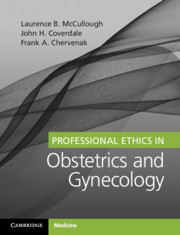Book contents
- Professional Ethics in Obstetrics and Gynecology
- Professional Ethics in Obstetrics and Gynecology
- Copyright page
- Dedication
- Contents
- Preface
- Acknowledgments
- Section 1 Professional Ethics in Obstetrics and Gynecology
- Section 2 Pedagogy of Professional Ethics in Obstetrics and Gynecology
- Section 3 Professionally Responsible Clinical Practice
- Chapter 7 Prevention of Pregnancy
- Chapter 8 Initiation of Pregnancy
- Chapter 9 Induced Abortion and Feticide
- Chapter 10 Fetal Analysis
- Chapter 11 Periviability
- Chapter 12 Intrapartum Management
- Chapter 13 The Perfect Baby
- Chapter 14 Cancer and Pregnancy
- Chapter 15 Setting Ethically Justified Limits on Life-Sustaining Treatment
- Section 4 Professionally Responsible Leadership
- Section 5 Professionally Responsible Innovation and Research
- Section 6 Professionally Responsible Health Policy and Advocacy
- Glossary of Key Concepts
- Index
- References
Chapter 10 - Fetal Analysis
from Section 3 - Professionally Responsible Clinical Practice
Published online by Cambridge University Press: 01 November 2019
- Professional Ethics in Obstetrics and Gynecology
- Professional Ethics in Obstetrics and Gynecology
- Copyright page
- Dedication
- Contents
- Preface
- Acknowledgments
- Section 1 Professional Ethics in Obstetrics and Gynecology
- Section 2 Pedagogy of Professional Ethics in Obstetrics and Gynecology
- Section 3 Professionally Responsible Clinical Practice
- Chapter 7 Prevention of Pregnancy
- Chapter 8 Initiation of Pregnancy
- Chapter 9 Induced Abortion and Feticide
- Chapter 10 Fetal Analysis
- Chapter 11 Periviability
- Chapter 12 Intrapartum Management
- Chapter 13 The Perfect Baby
- Chapter 14 Cancer and Pregnancy
- Chapter 15 Setting Ethically Justified Limits on Life-Sustaining Treatment
- Section 4 Professionally Responsible Leadership
- Section 5 Professionally Responsible Innovation and Research
- Section 6 Professionally Responsible Health Policy and Advocacy
- Glossary of Key Concepts
- Index
- References
Summary
This chapter provides an ethical framework to guide decision making about fetal analysis.
The ethical principle of respect for autonomy in professional ethics in obstetrics creates the obstetrician’s prima facie ethical obligation to empower the pregnant patient to make informed and voluntary decisions about obstetric management. This ethical obligation has two components. The first is providing her with clinical information about options for fetal analysis using nomenclature that is precise.
- Type
- Chapter
- Information
- Professional Ethics in Obstetrics and Gynecology , pp. 133 - 138Publisher: Cambridge University PressPrint publication year: 2019



